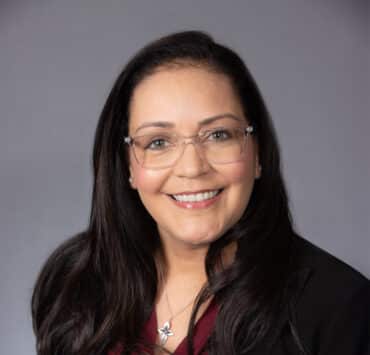It was his family who helped steer Kenny Yu down the healthcare path.
Through their sacrifices, Yu’s parents always supported him in achieving his goals. From an early age, they encouraged him to help others and to pursue a healthcare career.
Yu also looked up to his uncle, a primary care physician, and took his advice in high school to consider a pharmacy career. Yu attended Rutgers, his uncle’s alma mater, where he fell in love with the profession. He’s never looked back.
What makes him so passionate about a pharmacy career? “I’m highly competitive by nature, and so I always want to take an opportunity to improve,” Yu admits. He has watched the profession evolve to take on a business component and has embraced chances to explore other areas of expertise that strengthen his skills as a pharmacist.
“As a healthcare leader, I owe it to the profession to leave it better than I found it.”
Kenny Yu
Yu is now the system senior director of pharmacy services at NYU Langone Health. His history with the organization dates to 2009, when he did a rotation in its Cancer Center as a student. He joined the academic medical center full-time in 2010. He’s climbed the corporate ladder over the past decade (staff pharmacist, pharmacy manager, and assistant director of ambulatory services), repeatedly filling the gaps in various roles he’s taken on.
“Every position that I’ve taken, I’ve always said that’s going to be my biggest professional challenge of my career,” Yu says. “I’ve stepped up to the challenge of new roles that weren’t previously well-defined and made them my own—while keeping the organization’s core principles and mission as my focal point.”
Work/Life Harmony
When asked how he strikes a balance between his personal and professional life, Kenny Yu says it comes down to establishing work/life harmony. There will be long stretches of time when the senior director has to spend more time than usual at work, but there will be other periods when he can give his family his full attention.
“The guilt never goes away when you’re not with your family,” he admits. “But being more thoughtful and more mindful of the time that you do have with them—to think about quality time instead of quantity of time with the family—allows me to have that harmony between work and family.”
The 340B Eligibility Program
In 2016, Yu was promoted to director of pharmacy with a focus on pharmacy business, analytics, and the daunting new 340B program. NYU had just become eligible for participation. The program also allowed the organization to save significantly on pharmaceutical purchases.
“I was very nervous and had a healthy fear of failing, I would say,” Yu recalls of his selection as the inaugural director. “I didn’t know the program at all, and I needed to build it out.”
But he was ready for the challenge. With the help of a colleague outside the healthcare industry, Yu mapped out a plan to become a subject-matter expert and to build out a network. He and his team leaned on experienced consultants, external partners, internal auditors, attorneys and other internal resources to identify risks and vulnerabilities as they developed a robust and compliant program.
“Running a compliant program was the number one priority for me, because it was a lifeline for the organization,” Yu explains. The program helps with reinvestment into healthcare for the community, thus improving overall access and care for patients.
Enhanced Quality
Another focus of Yu’s is to elevate the profession of pharmacy and what it can do to mitigate things like drug shortages.
“We know that [with] generic medications, there’s ebbs and flows in drug shortages. Seeing how it can play a role for overall public health to ensure that medications are available safely and from a quality standpoint for all patients is another passion of mine,” Yu explains. “Then that translates over to what I need to do for our organization at NYU to ensure that we continue to provide safe and quality care.”
From being fiscally responsible, to ensuring a reliable transition from inpatient to the ambulatory setting, to making sure patients have the proper dosages and are adherent to their treatment plans, pharmacists can play a key role by “communicating all that information, clinical knowledge, back to the appropriate clinicians and stakeholders.”
“Taking [medication] the right way and the safe way is something that I continue to try to think differently and creatively about,” Yu says, “to make sure that I can continue to elevate the service and the quality that we provide to our patients.”
Advice for Up-and-Coming Pharmacists
What’s Yu’s advice for aspiring pharmacists? “It’s simpler said than done, but it’s to be open and embrace change,” Yu says. “With AI here, we always get questions of, ‘Is AI going to replace pharmacists?’ Well, if you let it, then yes. But if you embrace AI and leverage it to help you operate at the top of your license—and redefine what the top of your license means—then you’re going to be better off in the future.”
He also recommends staying aware of others, whether it’s them or you who could use help. “Being open to new ideas and listening to everyone around you—in terms of what their pain points are, what their challenges are—and standing on the shoulders of those who came before you will allow you to see farther and go farther,” he says.
Yu has a mission for himself too. “As a healthcare leader, I owe it to the profession to leave it better than I found it.”
—
Interview conducted by Noah Johnson
Nonprofit generic pharmaceutical company Civica Rx was created by U.S. hospitals and philanthropies to prevent and mitigate drug shortages, ensuring the affordable supply of essential medications used in America’s critical care settings. We are deeply appreciative of founding member NYU Langone Health’s five years of support for Civica and grateful, in particular, for Kenny Yu’s valuable contributions as part of our Drug Selection Advisory Committee. Together, we have provided 180+ million units of medications to help treat 80+ million patients. Our new 140K sf sterile injectable manufacturing facility in Virginia will bring even more stability to the supply of key medications.


